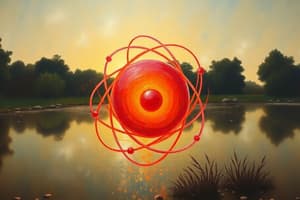Podcast
Questions and Answers
Who discovered the patterns in the visible spectral lines of hydrogen atoms?
Who discovered the patterns in the visible spectral lines of hydrogen atoms?
- Johann Jakob Balmer (correct)
- Erwin Schrödinger
- Albert Einstein
- Isaac Newton
Which series refers to the ultraviolet spectral lines of hydrogen atoms produced during radiative recombination?
Which series refers to the ultraviolet spectral lines of hydrogen atoms produced during radiative recombination?
- Paschen series
- Balmer series
- Lyman series (correct)
- Brackett series
What are the Lyman series lines known for in terms of their wavelength?
What are the Lyman series lines known for in terms of their wavelength?
- Being longer than Balmer series lines
- Having no specific wavelength range
- Appearing in the visible region
- Occurring at shorter wavelengths within the ultraviolet region (correct)
Which series of spectral lines is associated with electrons transitioning between different orbitals in a hydrogen atom's electron cloud?
Which series of spectral lines is associated with electrons transitioning between different orbitals in a hydrogen atom's electron cloud?
In which year was the Balmer series discovered, leading to a key understanding of the structure of the hydrogen atom?
In which year was the Balmer series discovered, leading to a key understanding of the structure of the hydrogen atom?
Which series involves transitions from higher energy states to lower energy states in hydrogen atoms?
Which series involves transitions from higher energy states to lower energy states in hydrogen atoms?
Which series consists of infrared radiation due to transitions from higher energy levels to ground level in a hydrogen atom?
Which series consists of infrared radiation due to transitions from higher energy levels to ground level in a hydrogen atom?
Which series is characterized by emissions primarily detected in the infrared part of the spectrum?
Which series is characterized by emissions primarily detected in the infrared part of the spectrum?
Which series is known for its emissions originating in high excited states of hydrogen atoms but emits in the near-infrared portion of the spectrum?
Which series is known for its emissions originating in high excited states of hydrogen atoms but emits in the near-infrared portion of the spectrum?
What differentiates the Brackett and Balmer series in terms of the electromagnetic spectrum?
What differentiates the Brackett and Balmer series in terms of the electromagnetic spectrum?
Which series' emissions are not observable in the visual spectrum due to small energy differences that do not generate photons?
Which series' emissions are not observable in the visual spectrum due to small energy differences that do not generate photons?
What fundamental properties are shared by both Brackett and Balmer series despite their spectral differences?
What fundamental properties are shared by both Brackett and Balmer series despite their spectral differences?
Flashcards are hidden until you start studying
Study Notes
Line Spectra of Hydrogen Atom
The line spectra of a hydrogen atom arise from quantum transitions between its energy levels. These atomic lines are observable in light emitted by hot gases such as stars, which produce line spectra characteristic of various elements. In this context, we'll focus on the specific line series associated with hydrogen—the Balmer series, Lyman series, Paschen series, and Brackett series.
Balmer Series
In 1885, Johann Jakob Balmer discovered patterns in the visible spectral lines of hydrogen atoms. He observed that these spectral lines could be described using a simple formula involving integers and Rydberg constants. This discovery formed the basis for understanding the structure of the hydrogen atom and laid the foundation for modern atomic theory. Today, we know that these spectral lines correspond to electrons transitioning between different orbitals in the hydrogen atom's electron cloud.
Lyman Series
The Lyman series refers to the set of ultraviolet spectral lines produced when hydrogen atoms undergo radiative recombination. They occur when an electron moves into one of several low-energy states from an ionized state. Because they originate in lower energy states compared to the Balmer series, Lyman series lines appear at shorter wavelengths within the ultraviolet region.
Paschen Series
The Paschen series consists of infrared radiation produced when a hydrogen atom transitions from higher energy levels back down to ground level. Unlike the other three series mentioned here, it does not have any corresponding optical emission lines because the energy differences involved are too small to generate photons in the visual spectrum. Thus, these emissions are primarily detected in the infrared part of the spectrum.
Brackett Series
Similar to the Balmer series, the Brackett series is characterized by emissions originating in high excited states of hydrogen atoms. However, unlike Balmer series emissions, which fall entirely within the visible spectrum, most Brackett series lines emit in the near-infrared portion of the spectrum. Aside from their position along different parts of the electromagnetic spectrum, the Bracket and Balmer series share numerous similarities, including fundamental properties like energy quantization and wave nature of matter.
Though each series has unique characteristics, they all stem from transitions between energy levels in the hydrogen atom. Understanding these spectral lines helps us better comprehend stellar phenomena, such as how elements form during star formation and what conditions lead to supernovae explosions. By studying the hydrogen atom's line series, astronomers can learn more about the universe beyond our immediate solar system.
Studying That Suits You
Use AI to generate personalized quizzes and flashcards to suit your learning preferences.




